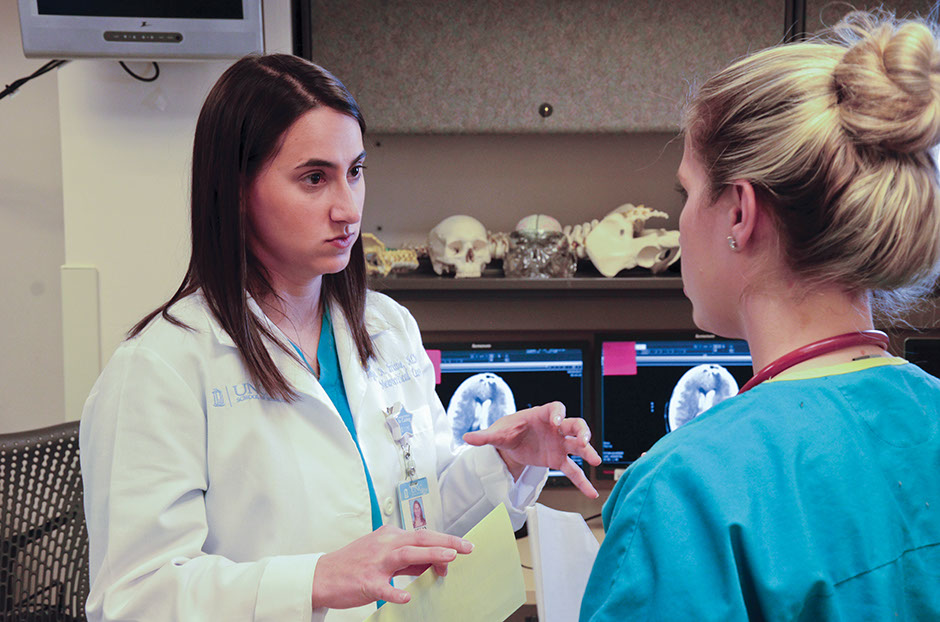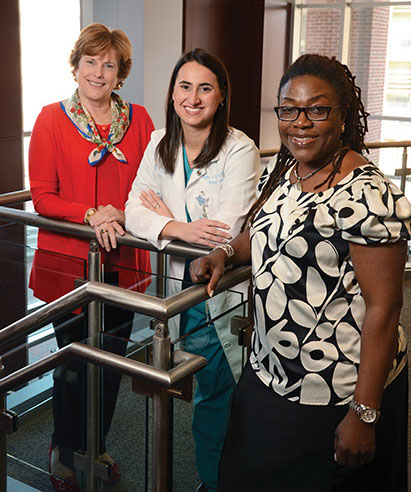
New Doctor in Nursing Practice degree helps nurses bridge the gap between research and patient care
Valerie Idada-Parker had questions. As a nurse practitioner in the psychiatric emergency department at UNC Hospitals, she had plenty of experience and education, but she still found herself wrestling with why her addiction patients kept relapsing. Even though she followed the recommended programs, she wasn’t seeing the recoveries she wanted in her patients.
While there is substantial addiction research available, health care providers aren’t always making the best of it in their daily practice. “It’s not working,” Idada-Parker says.
That’s why Idada-Parker decided to continue her education at the University of North Carolina at Chapel Hill, where she earned her previous degrees. She enrolled in the new Doctor in Nursing Practice (DNP) program, which teaches higher-level clinical skills and deeper concepts than Idada-Parker learned at the master’s level. To bring its students to the pinnacle of nursing practice scholarship, the DNP program steeps its students in the literature. For Idada-Parker, that means the DNP program allows her to ask—and to answer—her questions about relapse.

Idada-Parker says the DNP program gave her “that thing that was missing” in her work as a nurse practitioner: an ability to critique and evaluate research to make sure that it’s evidence-based. After only a few months, she has already identified research that she can apply to her own practice to help improve outcomes for her addiction patients. “What I have found is that we put all of our patients together, and you can’t do that. Not everybody is ready. Not everybody is motivated at the same level,” says Idada-Parker.
Through an extensive literature review, Idada-Parker found that health care providers should separate patients into groups based on how ready they are for change and give them care tailored to their needs. The most exciting part of Idada-Parker’s exploration of the literature is that since she maintains her position at UNC Hospitals, she can immediately make improvements to the patient care she and her colleagues provide. “I hope I’ll be a change agent,” Idada-Parker says.
After she graduates, Idada-Parker plans to continue in her role as a health care provider, and at the same time, write evidence-based policy. Idada-Parker says policies must be connected with real experience of patient care. “You can’t do one without the other,” Idada-Parker says.
The DNP program is among the newest in The Graduate School. Its first 13 students enrolled in August of 2013. Program director Debra Barksdale says the need to create a program at UNC for the highest degree in nursing practice emerged within the last 10 years. “The rationale was that health care and health care systems were becoming increasingly complex. There was additional knowledge that those in practice needed to be effective in improving health outcomes,” says Barksdale. As Idada-Parker’s experience illustrates, the program is practice-focused and gives students the mentorship and instruction they need to become leaders in the nursing profession.
Megan Brissie also chose to enter the program because it bridges boots-on-the-ground patient care with the pragmatic application of clinical research.
“Gone are the days of ‘We’ve always done it this way.’ Now we’re on to ‘What is actually the best practice?’” Brissie says.
Brissie’s focus is on best practice in neurocritical care. While earning her master’s, Brissie became fascinated with acute neurological disorders. She remembers a woman who came into the acute care unit with symptoms of a stroke. The doctors and nurses acted quickly, and the woman made a recovery that Brissie says she will never forget.

“The next day, she was able to wave at me as I entered her room,“ Brissie says—the awe apparent in her voice.
Brissie hopes that the best practices she studies in the DNP program will allow her to achieve equally dramatic recoveries in her future patients.
Cathy Madigan had different reasons for enrolling in the DNP program. The DNP not only trains nurses in the highest level of hands-on care, it also prepares nurses to become leaders in important roles outside of clinical practice, such as administration and organizational leadership.
Madigan already knows a lot about being a leader. She’s the current vice president and associate chief nursing officer at UNC Hospitals. Still, she says the DNP program has a great deal to offer her.
“You get to focus on something that really interests you,” Madigan says. She’s using her time in the program to look into how diversity is connected to patient satisfaction and tie her findings into the work she’s already doing at the hospital. Madigan says that the mentorship and instruction she receives from her professors is top-notch and that the faculty has been open to collaborating with her on her projects. “It’s like having a microcosm of the smartest people in the nursing profession right in my backyard.”
